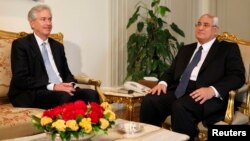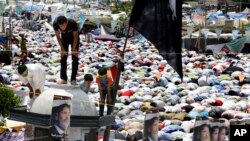U.S. Deputy Secretary of State William Burns said the United States will not try to impose its model of democracy on Egypt and that it recognizes only Egyptians can determine their future.
Burns met in Cairo Monday with leaders of the new military-installed interim government as it attempts to move ahead with a transition plan.
Burns, the first senior U.S. official to visit Egypt since the army removed Morsi, said he "did not come to lecture anyone."
He also told reporters Egypt is in no danger of repeating the Syrian tragedy because its leaders "understand the dangers of polarization," adding that the key to success is "ensuring a sense of inclusion at every stage of the political transition."
Burns is also expected to meet with civil society and business leaders during his Cairo visit, which lasts through Tuesday.
The State Department said that in all his meetings, Burns would underscore U.S. support for the Egyptian people, an end to all violence, and a transition leading to an inclusive, democratically elected civilian government.
The U.S. administration has been criticized both by Morsi supporters and opponents for what each side has perceived as support for the other.
The Muslim Brotherhood and other Egyptians continue to protest the ouster of President Mohamed Morsi less than two weeks ago.
Egypt's army said it would respond with "utmost severity and force" if demonstrators tried to approach or break into its bases.
The Muslim Brotherhood and other Morsi supporters have been maintaining a protest outside Cairo's Rabia el-Adawiya Mosque, demanding Egypt's first democratically-elected president be returned to power.
Brotherhood spokesman Mohamed Baltagi insisted that his camp won't accept the new interim regime.
He said there would be a 'Million Man march' Monday in all the public places across Egypt for people to declare that they have chosen their leaders, their institutions, their constitution and that they will prevail.
Anti-Morsi demonstrators also vow to keep demonstrating in Cairo's Tahrir Square.
The Tamarud group, which initiated protests in Tahrir Square that toppled Morsi, held a press conference to insist that its supporters would remain there to prevent the ousted leader from returning to power.
But VOA's Edward Yeranian in Cairo said the punishing summer heat and grueling daylight fast for Ramadan kept the streets of Cairo empty most of Monday, despite calls by secular and Islamist groups to protest. Ordinary Egyptians appeared to ignore the verbal jousting, going about business as usual.
Meanwhile, Egyptian Army helicopters tossed pamphlets over the mostly empty Rouba Adawiya protest camp, where Muslim Brotherhood supporters have been holding a daily vigil. The pamphlets urged protesters to abstain from violence and respect their political opponents.
Egyptian Army commander and Defense Minister, General Abdel Fattah al Sissi also defended the army's role in the recent overthrow of Morsi, insisting that the ousted president had split Egyptian society in two and created conflicts with most of the institutions of state. He rejected accusations that the move was religiously motivated.
The general said the army is at the service of the people and only got involved in politics because the people asked it to do so. He insisted that former President Morsi picked quarrels with the courts, the police, the people and the army, and that the army could not accept such behavior.
Morsi has been held at an undisclosed location since his removal, while a number of senior Muslim Brotherhood members have been taken into custody. Authorities have not charged the former president with a crime, but say they are investigating a series of complaints against him including spying and wrecking the economy.
Also Monday, Egyptian authorities said suspected militants attacked a bus carrying factory workers in the north Sinai town of El-Arish, killing at least three people and wounding 17 others. The Sinai Peninsula has seen a rise in violence since Morsi's July 3 ouster.
Edward Yeranian in Cairo contributed to this report
Burns met in Cairo Monday with leaders of the new military-installed interim government as it attempts to move ahead with a transition plan.
Burns, the first senior U.S. official to visit Egypt since the army removed Morsi, said he "did not come to lecture anyone."
"My message has been simple," he said. "The United States remains deeply committed to Egypt's democratic success and prosperity. We want a strong Egypt, an Egypt which is stable, democratic, inclusive and tolerant."
He also told reporters Egypt is in no danger of repeating the Syrian tragedy because its leaders "understand the dangers of polarization," adding that the key to success is "ensuring a sense of inclusion at every stage of the political transition."
Burns is also expected to meet with civil society and business leaders during his Cairo visit, which lasts through Tuesday.
The State Department said that in all his meetings, Burns would underscore U.S. support for the Egyptian people, an end to all violence, and a transition leading to an inclusive, democratically elected civilian government.
The U.S. administration has been criticized both by Morsi supporters and opponents for what each side has perceived as support for the other.
The Muslim Brotherhood and other Egyptians continue to protest the ouster of President Mohamed Morsi less than two weeks ago.
Egypt's army said it would respond with "utmost severity and force" if demonstrators tried to approach or break into its bases.
The Muslim Brotherhood and other Morsi supporters have been maintaining a protest outside Cairo's Rabia el-Adawiya Mosque, demanding Egypt's first democratically-elected president be returned to power.
Brotherhood spokesman Mohamed Baltagi insisted that his camp won't accept the new interim regime.
He said there would be a 'Million Man march' Monday in all the public places across Egypt for people to declare that they have chosen their leaders, their institutions, their constitution and that they will prevail.
Anti-Morsi demonstrators also vow to keep demonstrating in Cairo's Tahrir Square.
The Tamarud group, which initiated protests in Tahrir Square that toppled Morsi, held a press conference to insist that its supporters would remain there to prevent the ousted leader from returning to power.
But VOA's Edward Yeranian in Cairo said the punishing summer heat and grueling daylight fast for Ramadan kept the streets of Cairo empty most of Monday, despite calls by secular and Islamist groups to protest. Ordinary Egyptians appeared to ignore the verbal jousting, going about business as usual.
Meanwhile, Egyptian Army helicopters tossed pamphlets over the mostly empty Rouba Adawiya protest camp, where Muslim Brotherhood supporters have been holding a daily vigil. The pamphlets urged protesters to abstain from violence and respect their political opponents.
Egyptian Army commander and Defense Minister, General Abdel Fattah al Sissi also defended the army's role in the recent overthrow of Morsi, insisting that the ousted president had split Egyptian society in two and created conflicts with most of the institutions of state. He rejected accusations that the move was religiously motivated.
The general said the army is at the service of the people and only got involved in politics because the people asked it to do so. He insisted that former President Morsi picked quarrels with the courts, the police, the people and the army, and that the army could not accept such behavior.
Morsi has been held at an undisclosed location since his removal, while a number of senior Muslim Brotherhood members have been taken into custody. Authorities have not charged the former president with a crime, but say they are investigating a series of complaints against him including spying and wrecking the economy.
Also Monday, Egyptian authorities said suspected militants attacked a bus carrying factory workers in the north Sinai town of El-Arish, killing at least three people and wounding 17 others. The Sinai Peninsula has seen a rise in violence since Morsi's July 3 ouster.
Edward Yeranian in Cairo contributed to this report






